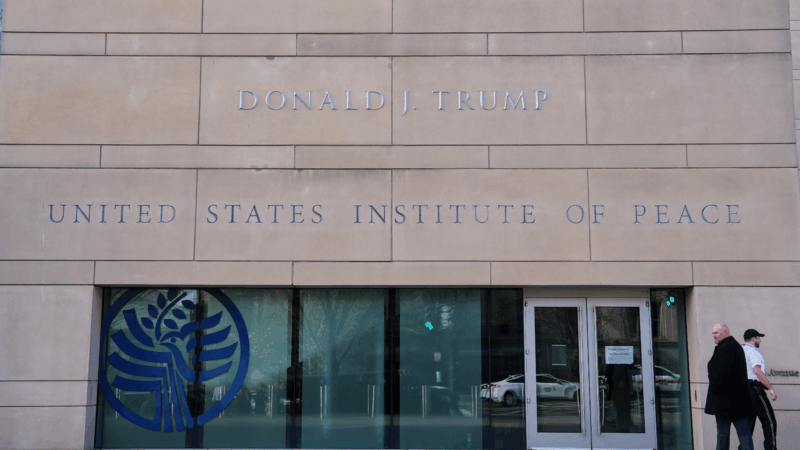Two officials fired by Trump return to court to challenge his power
Appellate judges in Washington, D.C., will consider a key question on Friday: Does the president have the Constitutional authority to fire board members at agencies created by Congress to be independent of the White House?
More specifically: Did President Trump overstep when he removed National Labor Relations Board member Gwynne Wilcox and Merit Systems Protection Board member Cathy Harris from their positions without cause?
Already, lower court judges have said yes, citing a 1935 Supreme Court decision known as Humphrey’s Executor that upheld limits Congress placed on the president’s removal powers. The judges ordered Wilcox and Harris temporarily returned to their seats.
But the Trump administration appealed those decisions, arguing that the lower court judges erred in their interpretation of that 1935 decision and that they exceeded their authority in ordering reinstatement. After some back and forth involving emergency motions at the D.C. Circuit Court of Appeals, the Supreme Court stepped in on April 9, with Chief Justice John Roberts issuing an order clearing the way for Wilcox and Harris to be removed again until the merits of their cases could be considered.
Of the three D.C. Circuit Court judges who will hear those merit arguments Friday, two are Trump appointees who — in this case and a related one — have supported the government’s stance that the Constitution gives Trump the power to control the executive branch as he sees fit. The third judge, a Biden appointee, sees it differently.
Agency independence at stake
At stake in this case are not just Wilcox and Harris’ jobs, but the jobs of people Trump has fired elsewhere in a similar fashion, including at the Federal Trade Commission and the Equal Employment Opportunity Commission.
Congress created these “independent agencies” with some protections from political interference written into law. They are led by boards or commissions whose members are nominated by presidents and confirmed by the Senate.
Congress required that these boards or commissions be bipartisan, with Democratic and Republican members serving staggered terms. By law, the president can only fire members for cause, such as neglect of duty or malfeasance.
Now, the Trump administration says such restrictions are unconstitutional, while Congress has been largely silent on the issue.
“Article II of the U.S. Constitution vests the entire executive power in a single President, who alone is accountable to the people,” Trump wrote in his letter to Wilcox, terminating her.
Wilcox and Harris have warned that a ruling in the president’s favor would put the independence of other government boards, including the Federal Reserve, at risk. If the court finds that Trump has the Constitutional authority to fire them, they warn, then nothing will stand in the way of his firing Fed Chair Jerome Powell, something Trump has threatened but recently said he had “no intention” of doing.
The Trump administration has tried to quell those fears, writing in court filings that the Federal Reserve is “a unique institution with a unique history and background,” affording it a degree of insulation from presidential control.
“That does not hold up,” wrote Harris’ attorneys in their reply. “There is no coherent way to create a special ‘Federal Reserve exception’ that cabins the destructive effects of the government’s theory.”
Competing interpretations of the Constitution
Wilcox and Harris have argued that overturning Humphrey’s Executor would create chaos. The Trump administration contends it is not trying to overturn the legal precedent.
Rather, the government’s attorneys have argued that Humphrey’s Executor does not apply to Wilcox and Harris given the “substantial executive power” that their agencies wield today — power the Trump administration says the Supreme Court did not consider 90 years ago.
The way the Trump administration lawyers describe it: The Constitution vests executive power — all of it — in the president. A court can’t force the president to retain someone he doesn’t trust to carry out his policies, they argue.
“Heads of agencies within the Executive Branch must share the objectives of my administration and its commitment to serving the will of the American people,” Trump wrote in his letter to Wilcox.
Wilcox’s attorneys call this an aggressive new interpretation of the Constitution. They’ve argued that the National Labor Relations Board’s powers — which include hearing appeals over labor disputes, issuing remedies, and making rules pertaining to how federal labor law is carried out — are not nearly as broad as the government makes them out to be, noting that the board must go to court to have its decisions enforced.
Harris’ attorneys, meanwhile, charge the government is attempting to narrow Humphrey’s Executor “into oblivion” in arguing that it doesn’t apply to the Merit Systems Protection Board, which hears employment-related complaints brought by federal workers against their agencies.
“If this Board is not constitutional under Humphrey’s Executor, nothing is,” they write.
Iran and the U.S. lean into gunboat diplomacy as nuclear talks hang in balance
Iran and the United States leaned into gunboat diplomacy Thursday, with Tehran holding drills with Russia and the Americans bringing another aircraft carrier closer to the Mideast.
Former South Korean President Yoon receives life sentence for imposing martial law
Former President Yoon Suk Yeol was sentenced to life in prison for his brief imposition of martial law in December 2024.
José María Balcázar becomes Peru’s eighth president in a decade
José María Balcázar has become Peru's new interim president, replacing another interim leader who was removed over corruption allegations just four months into his term.
Trump gathers members of Board of Peace for first meeting, with some U.S. allies wary
President Donald Trump will gather Thursday with representatives from more than two dozen countries that have joined his Board of Peace, for a meeting that will focus on the reconstruction of Gaza.
With a win over Sweden, the U.S. men’s hockey team will play for an Olympic medal
A thrilling overtime goal by defenseman Quinn Hughes puts Team USA through to a semifinal game against Slovakia. On the other side of the bracket, Canada had its own close call, but moves on to face Finland.
Zuckerberg grilled about Meta’s strategy to target ‘teens’ and ‘tweens’
The billionaire tech mogul's testimony was part of a landmark social media addiction trial in Los Angeles. The jury's verdict in the case could shape how some 1,600 other pending cases from families and school districts are resolved.







